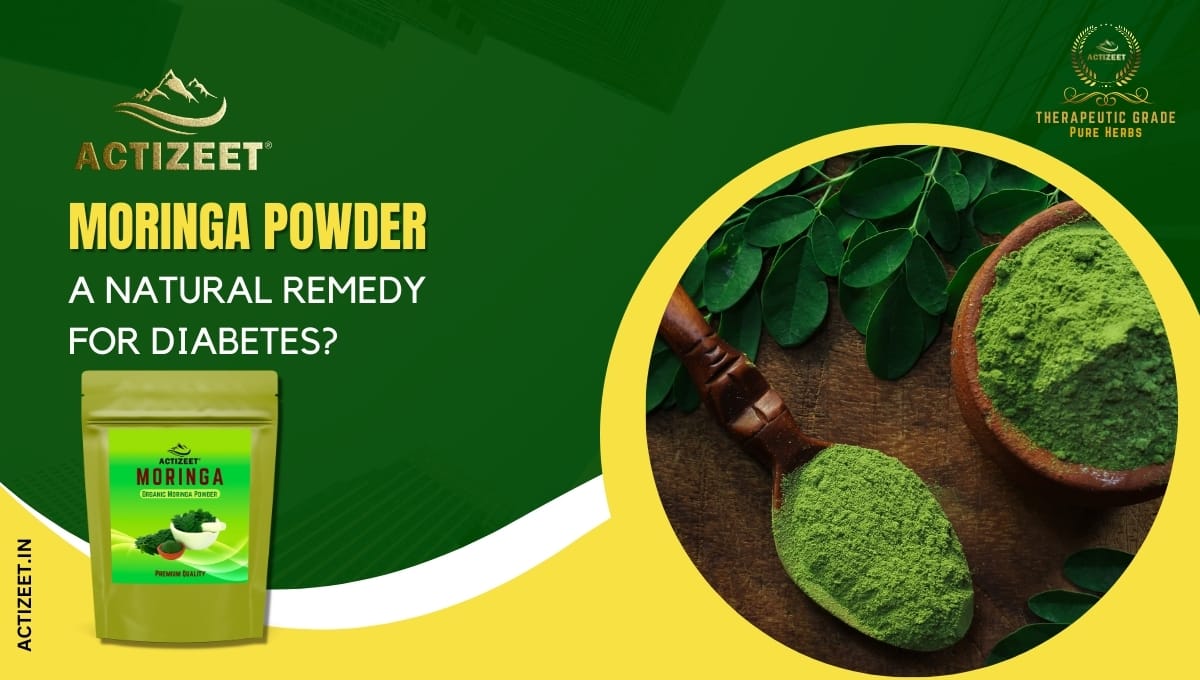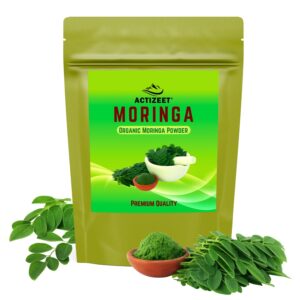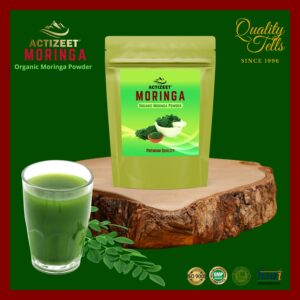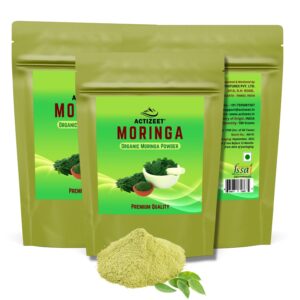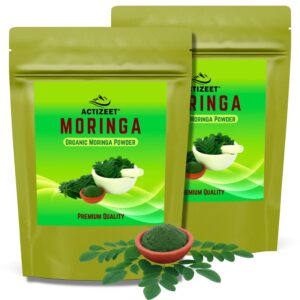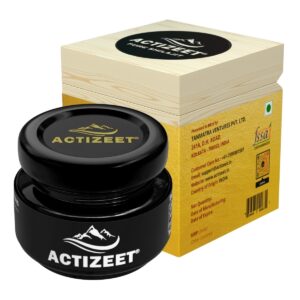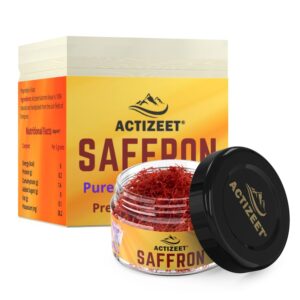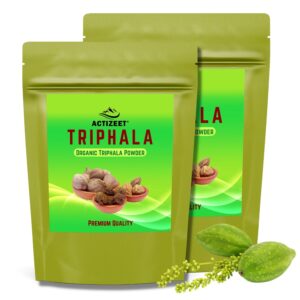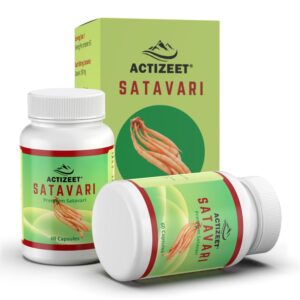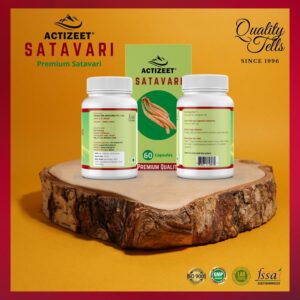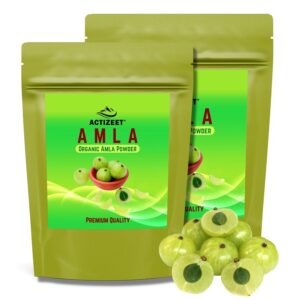Diabetes, a chronic condition characterized by high blood sugar levels, has become a global health concern. According to the World Health Organization (WHO), an estimated 422 million people worldwide were living with diabetes in 2014, and this number is expected to rise to 592 million by 2035. With such alarming statistics, it is crucial to explore alternative approaches to managing this condition effectively.
Table of Contents
ToggleOverview of Moringa Powder
Moringa powder, derived from the leaves of the Moringa oleifera tree, has gained considerable attention in recent years due to its remarkable nutritional profile. This green superfood is packed with essential vitamins (such as A, C, and E), minerals like calcium and iron, antioxidants, and amino acids.
Its versatility allows it to be easily incorporated into various dishes or consumed as a dietary supplement. More than just a trendy health product on the market today, moringa powder possesses numerous potential health benefits that make it worthy of further exploration.
One area where this natural wonder has gained particular interest is its potential impact on diabetes management. We delve into the specifics of its nutritional composition and explore scientific research surrounding its effects on blood sugar levels and overall health improvement.
Understanding Diabetes
Diabetes and its Types (Type 1 and Type 2)
Diabetes, a chronic condition affecting millions worldwide, occurs when the body either doesn’t produce enough insulin or can’t effectively use the insulin it produces. Insulin is a hormone that regulates blood sugar levels and allows cells to absorb glucose for energy. Without proper insulin function, blood sugar levels rise, leading to various health complications.
Type 1 diabetes is an autoimmune disease where the immune system mistakenly attacks and destroys insulin-producing cells in the pancreas. This results in little to no production of insulin.
People with Type 1 diabetes rely on external sources of insulin through injections or pumps to manage their blood sugar levels. Type 2 diabetes is more common and typically develops over time due to lifestyle factors such as poor diet, sedentary behaviour, obesity, and genetics.
In this form of diabetes, the body becomes resistant to insulin or fails to produce enough of it. Lifestyle modifications, medication, and sometimes insulin therapy are used to manage type 2 diabetes.
Importance of Managing Blood Sugar Levels
Effective management of blood sugar levels is crucial for individuals with diabetes. When blood sugar is consistently high (hyperglycemia), it can damage various organs over time.
High blood sugar levels may result in complications such as cardiovascular diseases, kidney damage, nerve damage leading to neuropathy, eye problems including retinopathy, or even blindness. On the other hand, experiencing low blood sugar (hypoglycemia) can lead to immediate symptoms like weakness, confusion, and, in severe cases, unconsciousness or seizures.
Long-term consequences may include impaired cognitive function and an increased risk for cardiovascular events. Maintaining stable blood sugar levels within a target range helps reduce the risks associated with both hyperglycemia and hypoglycemia.
This involves adopting a balanced diet, engaging in regular physical activity, monitoring blood sugar levels, taking prescribed medications or insulin, and making necessary adjustments to lifestyle choices. Effective diabetes management aims to prevent complications and enable individuals with diabetes to lead healthy and fulfilling lives.
Moringa Powder: A Nutritional Powerhouse
Nutritional composition of moringa powder
Moringa powder, derived from the leaves of the Moringa oleifera tree, is a veritable treasure trove of essential nutrients. Packed with vitamins, minerals, and antioxidants, it offers an impressive nutritional profile that can greatly contribute to overall health and well-being.
One notable aspect of moringa powder’s composition is its rich vitamin content. It boasts high levels of vitamin A, which promotes healthy vision and supports immune function.
Additionally, it contains substantial amounts of vitamin C, a potent antioxidant that helps protect cells from damage caused by harmful free radicals. Vitamin E is another important component in moringa powder’s nutritional arsenal, known for its role in skin health and as an immune system booster.
Rich in vitamins (A, C, and E), minerals (calcium and iron), and antioxidants
Apart from its impressive array of vitamins, moringa powder also provides an abundant supply of essential minerals vital for maintaining optimal bodily functions. Calcium is particularly noteworthy as it aids in maintaining strong bones and teeth while supporting muscle function. Furthermore, iron—an essential mineral necessary for red blood cell formation—is found abundantly in moringa powder.
This can be particularly beneficial for individuals with diabetes, as they are at a higher risk of developing anaemia due to various factors associated with the condition. In addition to its vitamin and mineral content, moringa powder is teeming with antioxidants that play a crucial role in neutralizing harmful free radicals within the body.
These free radicals are responsible for oxidative stress, which has been linked to numerous chronic diseases, including diabetes. The presence of antioxidants such as quercetin and chlorogenic acid helps combat this oxidative stress by reducing inflammation markers and protecting against cellular damage.
Its potential benefits for overall health
With such an impressive nutritional composition, it’s no surprise that moringa powder can have a wide range of potential health benefits. Beyond its possible impact on diabetes, incorporating moringa powder into your diet may support overall well-being.
The high protein content in moringa powder makes it an excellent option for individuals seeking plant-based protein sources, especially vegans and vegetarians. Additionally, the presence of essential amino acids in moringa contributes to tissue repair and muscle growth, making it ideal for those engaged in physical activity or looking to build lean muscle.
Moreover, the vast array of nutrients found in moringa powder promotes healthy skin and hair, boosts energy levels, enhances immune function, and aids digestion. Its potential anti-inflammatory properties may also alleviate symptoms associated with various inflammatory conditions.
While more research is needed to fully understand the extent of these benefits, incorporating moringa powder as part of a well-balanced diet holds promise for enhancing one’s overall health and vitality. Overall, the nutritional powerhouse that is moringa powder offers a cornucopia of vitamins (A, C, and E), minerals (calcium and iron), antioxidants, and other essential nutrients that can contribute significantly to one’s well-being.
Its potential benefits extend beyond diabetes management and encompass multiple aspects of overall health maintenance. Incorporating this superfood into your daily routine might just be the key to unlocking a vibrant life brimming with vitality.
Moringa Powder’s Impact on Diabetes Management
Role of Moringa Powder in Regulating Blood Sugar Levels
When it comes to diabetes management, keeping blood sugar levels in check is of utmost importance. This is where moringa powder steps into the spotlight.
Numerous studies have shown its potential to lower fasting blood glucose levels, making it a promising aid for individuals dealing with diabetes. Moringa powder contains bioactive compounds like isothiocyanates and chlorogenic acid, which have been found to play a role in regulating blood sugar levels.
Potential Impact on Insulin Sensitivity
Insulin sensitivity refers to the body’s ability to respond effectively to insulin and utilize glucose efficiently. Impaired insulin sensitivity is often observed in individuals with type 2 diabetes.
However, research suggests that moringa powder may help improve insulin sensitivity. Some studies conducted on animal models have demonstrated that moringa leaf extract can enhance insulin action by increasing the uptake of glucose into cells and improving glucose tolerance.
Anti-inflammatory Properties of Moringa Powder
Inflammation plays a significant role in the development and progression of diabetes-related complications. Fortunately, moringa powder possesses potent anti-inflammatory properties that can potentially mitigate the impact of inflammation on individuals with diabetes.
The high concentration of antioxidants present in moringa helps combat oxidative stress, which is often heightened in diabetic patients due to the increased production of reactive oxygen species (ROS). By reducing oxidative stress and inflammation, moringa powder may contribute to improved overall health outcomes for those living with diabetes.
Reduction in Oxidative Stress Associated with Diabetes Complications
One notable consequence of uncontrolled diabetes is an increase in oxidative stress within the body. Oxidative stress occurs when there’s an imbalance between free radicals and antioxidants, leading to cellular damage.
Moringa powder contains a rich assortment of antioxidants, such as vitamin C, vitamin E, and beta-carotene, that help neutralize free radicals and reduce oxidative stress. By mitigating oxidative stress, moringa powder may potentially alleviate the risk of complications associated with diabetes, such as cardiovascular disease, neuropathy, and nephropathy.
Potential Improvement in Insulin Resistance
Insulin resistance is a prevalent condition in individuals with type 2 diabetes, where the body becomes less responsive to insulin’s actions. Some studies suggest that moringa powder might positively affect insulin resistance.
The bioactive compounds found in moringa, including quercetin and kaempferol, have been shown to enhance insulin signalling pathways and improve glucose uptake by cells. By improving insulin sensitivity and reducing resistance, moringa powder could potentially aid in managing blood sugar levels effectively for diabetic individuals.
The impact of moringa powder on diabetes management appears promising. Its potential to regulate blood sugar levels and improve insulin sensitivity offers hope for better glycemic control.
Furthermore, its anti-inflammatory properties not only reduce oxidative stress but also contribute to the overall well-being of individuals dealing with diabetes. However, it is crucial to consult with healthcare professionals before incorporating moringa powder into one’s routine as part of an integrated approach to diabetes care.
Research Studies and Evidence
When it comes to understanding the potential benefits of moringa powder for diabetes management, scientific studies have played a crucial role in shedding light on its effects. Researchers around the world have dedicated their time and efforts to investigating the impact of moringa on glycemic control and lipid profile improvement, as well as its antioxidant and anti-inflammatory properties.
Scientific studies exploring the effects of moringa on diabetes management
A review of several studies published in reputable scientific journals has shown promising results regarding the effects of moringa powder on diabetes management. A study conducted by researchers at a renowned university examined the impact of moringa supplementation on individuals with type 2 diabetes. The participants who consumed a controlled amount of moringa powder daily experienced significant reductions in their fasting blood glucose levels over 12 weeks.
This finding suggests that incorporating moringa into one’s diet may contribute to better glycemic control. Furthermore, another study focused on examining the lipid profile improvement associated with moringa consumption among individuals with diabetes.
The results indicated that subjects who consumed moringa powder experienced a decrease in total cholesterol, LDL (bad) cholesterol, and triglyceride levels. On the other hand, HDL (good) cholesterol levels increased significantly after regular intake of moringa for a certain duration.
Evidence supporting its antioxidant and anti-inflammatory properties
Moringa powder is renowned for its rich antioxidant content, which may play an essential role in combating the oxidative stress commonly associated with diabetes complications. Antioxidants help neutralize harmful free radicals that can damage cells and aggravate inflammation within the body.
Several studies have demonstrated that moringa contains potent antioxidants such as vitamin C, vitamin E, beta-carotene, quercetin, and chlorogenic acid. Moreover, beyond its antioxidant properties, moringa has also been shown to possess powerful anti-inflammatory effects.
Chronic inflammation is closely linked to insulin resistance, a hallmark of type 2 diabetes. By reducing inflammation levels, moringa powder may help improve insulin sensitivity and promote better glucose utilization by the body’s cells.
Moringa Powder Consumption Recommendations for Diabetic Individuals
Appropriate Dosage Guidelines for Incorporating Moringa Powder into a Diabetic Diet
When it comes to incorporating moringa powder into a diabetic diet, it is crucial to approach it with caution and consult with a healthcare professional or nutritionist beforehand. The recommended dosage of moringa powder may vary depending on individual factors such as age, weight, overall health condition, and the severity of diabetes. Generally, starting with a low dosage and gradually increasing it is advised to monitor the body’s response and ensure tolerance.
A common recommendation is to begin with around 1 teaspoon (approximately 3 grams) of moringa powder per day. This can be added to smoothies, juices, or sprinkled over salads for easy consumption.
It’s important not to exceed the suggested dosage without medical guidance, as excessive amounts may have adverse effects or interact with medications. Additionally, monitoring blood sugar levels regularly while introducing moringa powder into the diet is essential in assessing its impact on glycemic control.
Potential Interactions with Medications or Existing Health Conditions
While moringa powder offers promising potential benefits for individuals with diabetes, it’s essential to consider potential interactions with medications or existing health conditions. Moringa has natural blood sugar-lowering properties; therefore, combining it with certain diabetic medications could result in hypoglycemia (low blood sugar). If you are taking medication for diabetes management such as insulin or oral hypoglycemic drugs like metformin, it is vital to consult your healthcare provider before incorporating moringa powder into your routine.
Furthermore, if you have any underlying health conditions or take specific medications regularly, discussing the use of moringa powder becomes even more important. For instance, individuals who are on anticoagulant medication should exercise caution, as moringa may have mild blood-thinning properties.
Additionally, individuals with kidney or liver disorders should seek professional advice before consuming moringa powder, as high doses could potentially strain these organs. Remember, it is always better to err on the side of caution and consult with a healthcare professional to ensure the safe and effective integration of moringa powder into your diabetic diet.
Tips for Incorporating Moringa Powder into Daily Routine
Suggestions for adding moringa powder to meals
Incorporating moringa powder into your daily routine is easier than you might think. Here are some creative and delicious ways to enjoy the benefits of this remarkable superfood:
- Smoothies: Whip up a vibrant and nutritious smoothie by adding a teaspoon or two of moringa powder to your favourite fruit blend. The earthy flavour of moringa blends well with tropical fruits like mango, pineapple, and banana. For an extra kick of antioxidants, add a handful of spinach or kale.
- Salad Dressings: Upgrade your salads by incorporating moringa powder into homemade dressings. Mix it with olive oil, lemon juice, minced garlic, and a sprinkle of salt and pepper for a zesty dressing that not only enhances the flavour but also boosts the nutritional value.
- Soups and Stews: Enhance the goodness of your hearty soups or stews with the addition of moringa powder.
- Stir in a tablespoon during the cooking process to infuse it with essential nutrients while adding subtle earthy notes to your dish.
- Baked Goods: Get creative in the kitchen by incorporating moringa powder into baked goods like muffins, bread, or energy bars. Its mild taste pairs well with ingredients such as coconut flour, almond butter, or dark chocolate chips.
- Nutrient Booster: Sprinkle a teaspoon of moringa powder onto already prepared meals like roasted vegetables, pasta dishes, or even popcorn for an extra nutritional punch without altering the taste significantly.
Conclusion
Incorporating moringa powder into your daily routine can be both beneficial to your health and an exciting culinary adventure. Its rich nutritional profile makes it an excellent addition to any diet, especially for individuals managing diabetes.
From smoothies to salads, soups to baked goods, there are endless possibilities to explore and enjoy the benefits of this vibrant superfood. By incorporating moringa powder into your meals, you not only introduce a plethora of essential vitamins, minerals, and antioxidants into your diet, but you also contribute to better blood sugar management.
Remember to consult with your healthcare provider before making any significant changes to your diet or adding new supplements. So go ahead and embrace the wonders of moringa powder in your daily routine—it’s time to unlock its potential for improved health and well-being!
ACTIZEET Moringa Powder
-
Rated 4.85 out of 5
₹1,200.00Original price was: ₹1,200.00.₹900.00Current price is: ₹900.00. Incl. GST ADD TO CART Buy Now -
Rated 4.84 out of 5
₹3,600.00Original price was: ₹3,600.00.₹2,100.00Current price is: ₹2,100.00. Incl. GST ADD TO CART Buy Now -
Rated 4.80 out of 5
₹2,400.00Original price was: ₹2,400.00.₹1,600.00Current price is: ₹1,600.00. Incl. GST ADD TO CART Buy Now
Related Products
-
Himalayan Shilajit, Pure shilajit, Shilajit, SHUDDH SURYA TAPI SHILAJIT
Rated 4.74 out of 5₹4,950.00Original price was: ₹4,950.00.₹3,950.00Current price is: ₹3,950.00. Incl. GST ADD TO CART Buy Now -
Rated 4.86 out of 5
₹2,400.00Original price was: ₹2,400.00.₹1,600.00Current price is: ₹1,600.00. Incl. GST ADD TO CART Buy Now -
Rated 4.82 out of 5
₹2,400.00Original price was: ₹2,400.00.₹1,600.00Current price is: ₹1,600.00. Incl. GST ADD TO CART Buy Now -
Rated 4.84 out of 5
₹2,400.00Original price was: ₹2,400.00.₹1,600.00Current price is: ₹1,600.00. Incl. GST ADD TO CART Buy Now
-
Rated 4.00 out of 5
₹2,400.00Original price was: ₹2,400.00.₹1,600.00Current price is: ₹1,600.00. Incl. GST ADD TO CART Buy Now -
Rated 4.80 out of 5
₹2,400.00Original price was: ₹2,400.00.₹1,600.00Current price is: ₹1,600.00. Incl. GST ADD TO CART Buy Now -
Rated 4.71 out of 5
₹2,400.00Original price was: ₹2,400.00.₹1,600.00Current price is: ₹1,600.00. Incl. GST ADD TO CART Buy Now -
Rated 0 out of 5
₹2,400.00Original price was: ₹2,400.00.₹1,600.00Current price is: ₹1,600.00. Incl. GST ADD TO CART Buy Now
Related posts:
- Moringa Powder: A Natural Remedy to Melt Belly Fat?
- Harnessing the Power of Amla Powder for Diabetes Management: A Natural Approach
- Tribulus Terrestris: A Natural Remedy for Diabetes
- Emblica Officinalis: A Natural Remedy for Diabetes
- Safed Musli: A Natural Supplement For Diabetes Management
- Berberidaceae for Diabetes: Natural Remedy Revealed
- Unveiling the Mysteries: How Moringa Powder Works
- Moringa Benefits: The Ultimate Guide

